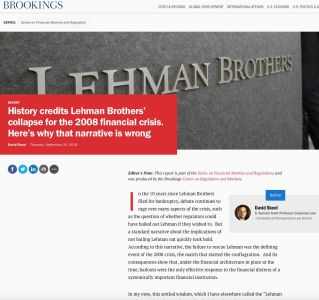Join getAbstract to access the summary!

Join getAbstract to access the summary!
David Skeel
History Credits Lehman Brothers’ Collapse for the 2008 Financial Crisis. Here’s Why That Narrative is Wrong.
Brookings Institution, 2018
What's inside?
Lehman Brothers’ demise was not the main trigger for the 2008 global financial crisis.
Recommendation
In 2008, Lehman Brothers had not planned for a worst-case scenario, because it assumed that regulators would step in to prevent its bankruptcy. Therein lay the problem, according to professor David Skeel in this thought-provoking reconsideration of Lehman’s role in the financial crisis. While the financial system looks better prepared today to weather future tumult, market expectations about potential government intervention remain consequential. This intriguing article makes an important contribution to policy debates on pending laws for distressed bank resolutions.
Summary
About the Author
David Skeel is a professor of corporate law at the University of Pennsylvania Law School.


















Comment on this summary